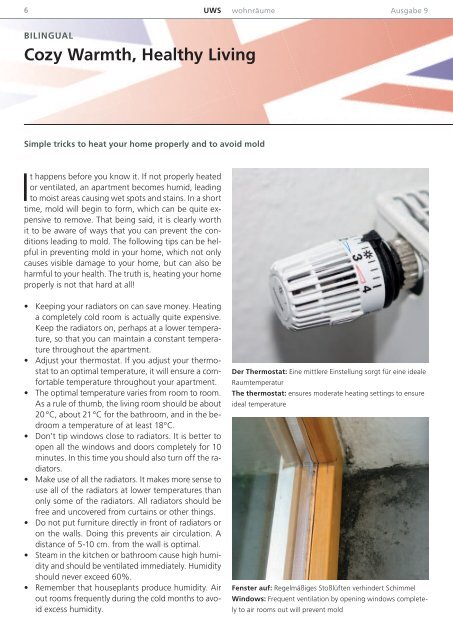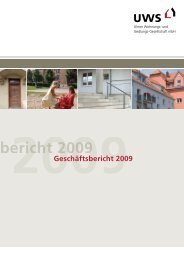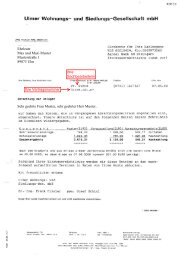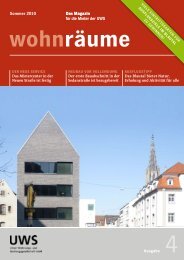Download - UWS Ulm
Download - UWS Ulm
Download - UWS Ulm
Sie wollen auch ein ePaper? Erhöhen Sie die Reichweite Ihrer Titel.
YUMPU macht aus Druck-PDFs automatisch weboptimierte ePaper, die Google liebt.
6 <strong>UWS</strong> wohnräume<br />
Ausgabe 9<br />
Ausgabe 9<br />
wohnräume <strong>UWS</strong><br />
7<br />
BILINGUAL ZWEISPRACHIG<br />
Cozy Warmth, Healthy Living Kuschelige Wärme – gesundes Wohnen<br />
Simple tricks to heat your home properly and to avoid mold Einfache Kniffe, mit denen Sie richtig heizen und Schimmelbefall vermeiden<br />
It happens before you know it. If not properly heated<br />
or ventilated, an apartment becomes humid, leading<br />
to moist areas causing wet spots and stains. In a short<br />
time, mold will begin to form, which can be quite expensive<br />
to remove. That being said, it is clearly worth<br />
it to be aware of ways that you can prevent the conditions<br />
leading to mold. The following tips can be helpful<br />
in preventing mold in your home, which not only<br />
causes visible damage to your home, but can also be<br />
harmful to your health. The truth is, heating your home<br />
properly is not that hard at all!<br />
• Keeping your radiators on can save money. Heating<br />
a completely cold room is actually quite expensive.<br />
Keep the radiators on, perhaps at a lower temperature,<br />
so that you can maintain a constant temperature<br />
throughout the apartment.<br />
• Adjust your thermostat. If you adjust your thermostat<br />
to an optimal temperature, it will ensure a comfortable<br />
temperature throughout your apartment.<br />
• The optimal temperature varies from room to room.<br />
As a rule of thumb, the living room should be about<br />
20 °C, about 21 °C for the bathroom, and in the bedroom<br />
a temperature of at least 18°C.<br />
• Don’t tip windows close to radiators. It is better to<br />
open all the windows and doors completely for 10<br />
minutes. In this time you should also turn off the radiators.<br />
• Make use of all the radiators. It makes more sense to<br />
use all of the radiators at lower temperatures than<br />
only some of the radiators. All radiators should be<br />
free and uncovered from curtains or other things.<br />
• Do not put furniture directly in front of radiators or<br />
on the walls. Doing this prevents air circulation. A<br />
distance of 5-10 cm. from the wall is optimal.<br />
• Steam in the kitchen or bathroom cause high humidity<br />
and should be ventilated immediately. Humidity<br />
should never exceed 60%.<br />
• Remember that houseplants produce humidity. Air<br />
out rooms frequently during the cold months to avoid<br />
excess humidity.<br />
Der Thermostat: Eine mittlere Einstellung sorgt für eine ideale<br />
Raumtemperatur<br />
The thermostat: ensures moderate heating settings to ensure<br />
ideal temperature<br />
Fenster auf: Regelmäßiges Stoßlüften verhindert Schimmel<br />
Windows: Frequent ventilation by opening windows completely<br />
to air rooms out will prevent mold<br />
Schnell ist es geschehen: Wer wiederholt nicht richtig<br />
heizt und lüftet, hat oftmals schneller als erwartet<br />
feuchte Stellen und Stockfl ecken in der Wohnung.<br />
Bis zum sichtbaren Schimmel ist es dann nicht mehr weit<br />
– und den zu entfernen kann teuer werden. Es lohnt sich<br />
darum, auf einige Kleinigkeiten zu achten. Mit diesen<br />
Tipps sind Sie optimal gerüstet und vermeiden Schimmelbefall,<br />
der Ihrer Gesundheit schaden könnte. Richtig<br />
heizen ist gar nicht schwer!<br />
• Wer den Heizkörper nie ganz abdreht, spart Geld,<br />
denn jedes Neuaufheizen eines kalten Raumes ist<br />
teuer. Mit konstanten Temperaturen kann gespart<br />
werden.<br />
• Die optimale Einstellung des Heizkörperthermostats<br />
sorgt für eine angenehme Temperatur.<br />
• Die optimale Temperatur unterscheidet sich von<br />
Raum zu Raum. Es gilt: Im Wohnzimmer ca. 20 °C,<br />
im Bad etwa 21 °C und im Schlafzimmer mindestens<br />
18 °C.<br />
• Gekippte Fenster vermeiden, wenn geheizt wird.<br />
Lieber für zehn Minuten stoßlüften: alle Fenster und<br />
Türen weit aufmachen und die Heizung in dieser Zeit<br />
abdrehen.<br />
• Alle Heizkörper in der Wohnung zu nutzen ist am<br />
sinnvollsten – sie sollten aber alle unbedeckt von<br />
einem Vorhang oder ähnlichem sein.<br />
• Vor Heizkörpern und an Wänden (besonders Außenwände)<br />
keine Einrichtungsgegenstände oder Möbel<br />
aufstellen, da dies die Luftzirkulation verhindern<br />
könnte. Ein Abstand von mindestens fünf, besser<br />
zehn Zentimetern ist optimal.<br />
• Hohe Luftfeuchtigkeit vermeiden: Bei Dampf während<br />
des Kochens oder Duschens sofort lüften! Denn<br />
die Luftfeuchtigkeit sollte nicht mehr als 60 % betragen.<br />
• Denken Sie daran: Viele Zimmerpfl anzen erzeugen<br />
eine hohe Luftfeuchte. Sie sollten dann während<br />
der Heizperiode öfters lüften.<br />
sokü<br />
Unschön und ungesund: Schimmel an der Wand<br />
Unsightly and unhealthy: Mold on the wall<br />
Mit freundlicher Unterstützung der<br />
Sprachschule Berlitz am Münsterplatz.










